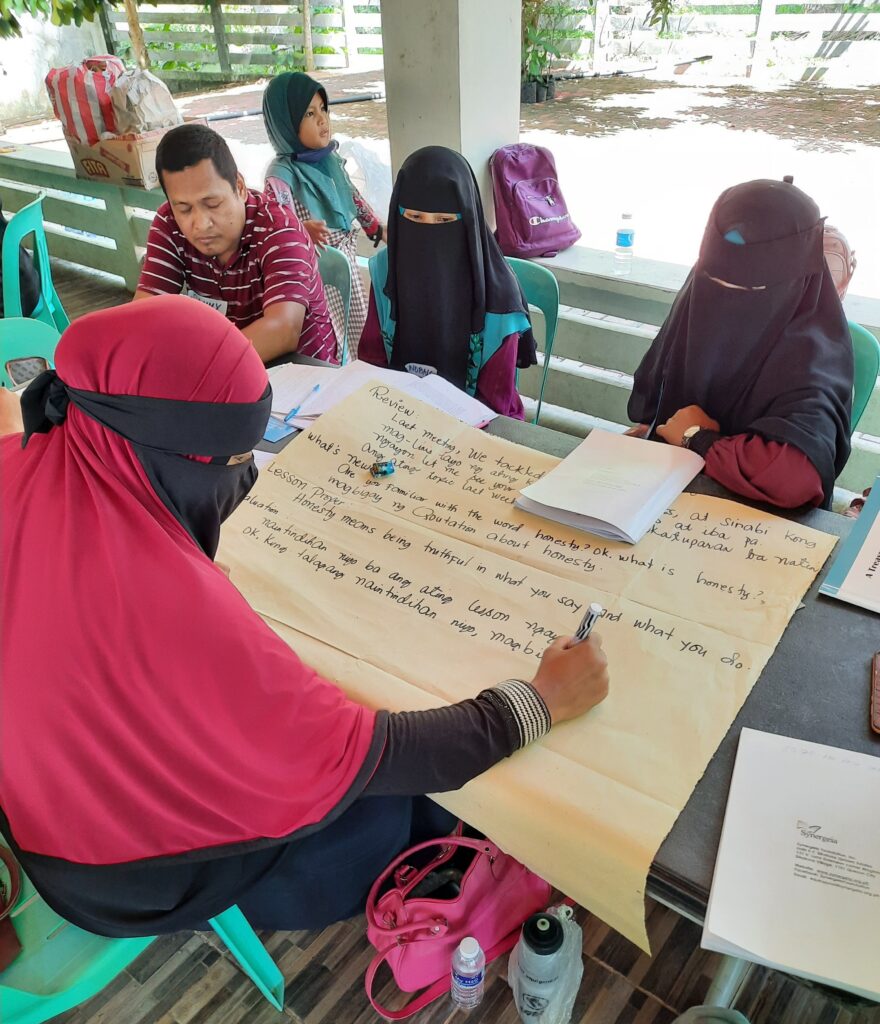
When Jalalodden Panganting was a grade 6 student, he became a volunteer Madrasah teacher. As a young lad, he would often admire his teachers’ commitment. He
marveled at their dedication despite the meager financial support the community gives them. Today, 14 years after, Jalal is a full-pledged Madrasah teacher under the Department of Education. However, despite his status as an ISAL teacher, Jajal admits that he still needs a lot of training to develop his teaching skills. Moreover, he laments that many Madrasah teachers find it hard to prepare proper lesson plans and deliver lessons effectively.
For the past several months, Jalal , together with 50 other Madaris teachers from Piagapo , attend the monthly meetings organized by Synergeia Foundation to harness the skills of the teachers. Together with the other ustadz, he highly appreciates the sessions designed to build their pedagogical skills.
The work with the teachers is part of Synergeia’s program to prevent the rise of violent extremism in the region. In recent years, the Madrasah schools of our Muslim brothers and sisters have been under scrutiny. In the aftermath of the Marawi Siege in 2017, reports showed that the extremists used the Madrasah schools as recruitment grounds. Teachers have debunked the claim. Instead, they have demonstrated that Muslim schools are havens for peace and non-violence.
Ustadz Jabolais Adunar, another teacher from Piagapo, shares that many of the Madrasah teachers are motivated to teach because they want to see the children grow up to become peace-builders in the future. Having seen and experienced the effects of conflict, Ustadz Jabolias only hopes that the younger generation will genuinely live out the true meaning of Islam – peace.
To help build the skills of the teachers, Synergeia has produced a manual entitled ‘A treasury of Lessons for Madaris.’ The manual promotes teaching the nine crucial values related to peace. These values are: Appreciation for Allah’s Creation, Cleanliness, Responsibility, Self-Discipline, Industry, Honesty and Trust, Humility, Kindness and Compassion, Love for Peace, Tolerance, and Unity. Every meeting, a group of teachers prepare their chosen topic and present a lesson demonstration using the points and activities offered in the manual. A critiquing process follows the demonstration, wherein the other participants comment on the strengths and weaknesses of the lesson presented. Afterward, a Synergeia staff also explains how teachers can use the activities in the manual to teach
the class properly.
Madrasah schools are divided into the traditional madrasah, and the DEPED recognized schools. The former is akin to the Sunday Schools we find in Christian Churches. These traditional schools are open two to three days a week. The community’s children go to them to learn Arabic and deepen their knowledge of the Islamic religion. The latter, on the other hand, are similar to the private-schools. They teach the entire K-12 curriculum with the added Arabic Language and Islamic Values.
While the teachers in the DEPED accredited schools are all professional teachers, those in the traditional Madrasah schools are community volunteers. Most do not have an education degree, while others wait to be hired within the public school system.
Traditional Madrasah schools get strong financial support from the community. The community sustains the school’s operations thru weekly and monthly donations. School administrators divide the contributions for the allowance of the teachers and the
supplies needed by the school. The asatidz and ustadz in Piagapo are lucky since the LGU also financially supports some Madrasah teachers of the municipality.
Currently 117 recognized Madrasah schools implement the Standard Madrasah Curriculum in BARMM. The BARMM government, thru the Ministry of Basic, Technical and Higher Education (MBTHE), recognizes the importance of the Madrasah school in the
academic and moral formation of Muslim children. In recent months, financial subsidies to support public and private Madaris across the region have continued to pour. These subsidies are essential for the upkeep of the Madrasah schools in the area. Many private and traditional Madrasah centers often find themselves sitting in dilapidated buildings needing many repairs. Teachers
would also require better materials and capability-building sessions to improve their skills.
Given all these concerns and needs of the Madaris schools, Teacher Jalal and his companions are more than grateful for the training they receive every month from Synergeia Foundation.
He says, “Sa ngayon nagpapasalamat kami sa Synergeia, kasi malaki ang improvement na natutunan namin sa inyo. Unang-una po ay natutunan naming paano kami mag-lesson plan. Nadagdagan ang kaalaman naming sa lesson plan. At dahil dun, mas na-enganyo kami magturo ng mga bata.”
But Jalal does not only keep the skills he has learned in the meetings to himself. Together with a group of other teachers, he goes around three other Madrasah
schools every Thursday and shares the ideas and strategies he learned from the monthly meetings. His group has taught 40 other teachers about developing proper lesson plans. He also discusses each unit of the manual with them.
Indeed, Jalal has gone a long way. The former Grade 6 volunteer has come full circle; from teaching his companions in school, he is now a guide to his fellow madrasah teachers.



